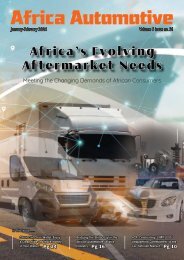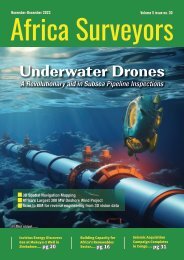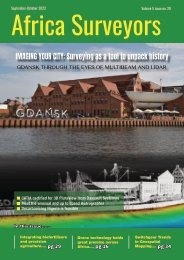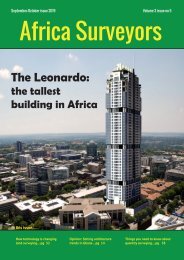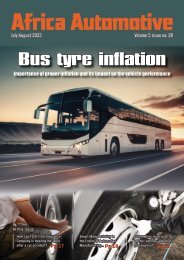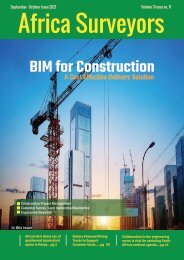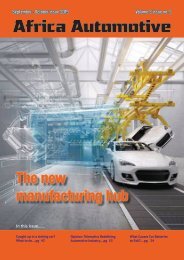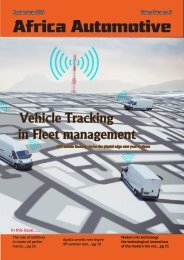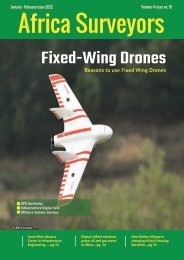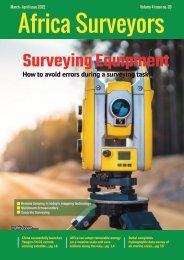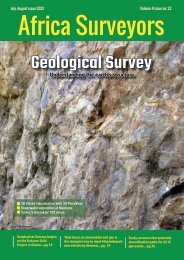Africa Surveyors January-February issue 2023 digital
Africa Surveyors is Africa’s premier source of Surveying, Mapping and Geospatial news and an envoy of surveying products/service for the Construction, Maritime, Onshore & Offshore energy and exploration, Engineering, Oil and Gas, Agricultural and Mining sectors on new solution based trends and technology for the African market.
Africa Surveyors is Africa’s premier source of Surveying, Mapping and Geospatial news and an envoy of surveying products/service for the Construction, Maritime, Onshore & Offshore energy and exploration, Engineering, Oil and Gas, Agricultural and Mining sectors on new solution based trends and technology for the African market.
You also want an ePaper? Increase the reach of your titles
YUMPU automatically turns print PDFs into web optimized ePapers that Google loves.
MINING
Mining
Africa needs
improved
governance
to reap the full
benefits of new mining
projects
Jason Mitchell
Jason Mitchell is a senior editor
at Investment Monitor, with a
specialisation in emerging markets.
He covered foreign investment in
Latin America for 13 years and for the
past three years has lived in sub-
Saharan Africa and written widely
about the subject from that continent's
perspective. Previously, in London, he
was editor of Investment Adviser and
news editor of Financial Adviser, both
of which belong to the Financial Times
Group
By Jason Mitchell
African countries must allow the
mining of minerals to happen if
they are to experience significant
economic growth, but they have to find a
way of minimising the damage to the natural
environment and to ensure that profits help
local communities.
Africa is a massive region, covering three
times as much ground as Europe, across 54
countries, and with a total population of 1.4
billion, which is expected to reach 2.5 billion
by the end of 2050. However, it is also the
world’s poorest region; in 2021, sub-Saharan
Africa had an annual income of $1,600 per
head compared with $8,300 in Latin America
and the Caribbean and $13,000 in East Asia
and the Pacific. In 2022, the UK had a bigger
economy than the whole of Africa combined;
$3.48tn versus $2.96tn.
In 2021, it is estimated that 490 million
Africans lived under the poverty line of $1.90
purchasing power parity equivalent per
day, 37 million people more than what was
projected without the Covid-19 pandemic.
Africa requires economic growth and lots
of it if its to lift its people out of poverty.
Economists estimate that a low-income
country must grow at more than 6% a year
over many years to start to see significant
poverty reduction. The International Monetary
Fund estimates that the sub-Saharan
economy expanded by only 3.6% in 2022 and
forecasts that it will grow by only 3.7% in
2023. That is just not good enough.
Following China’s example
The mining industry provides an obvious
source of wealth for Africa, and recent
developments in China could prove to be
something of a blueprint for African countries.
Since China began to open up and reform its
economy in 1978, GDP growth has averaged
over 9% a year and more than 800 million
people been lifted out of poverty, exactly the
kind of change that Africa needs.
Africa has some of the world’s biggest
deposits of minerals, which are not only
valuable in their own right, but could prove
essential to the energy transition. Nickel,
cobalt, graphite, lithium, and rare earth
elements are all in high supply; for instance,
Africa accounts for around 80% of the world’s
total supply of platinum, 50% of manganese
and two-thirds of cobalt. The continent also
holds 40% of the world’s gold reserves and up
to 90% of its chromium.
Countries like South Africa, Madagascar,
Malawi, Kenya, Namibia, Mozambique,
Tanzania, Zambia and Burundi enjoy
significant quantities of important rare earths,
including neodymium, praseodymium and
dysprosium. Ghana is the continent’s largest
producer of gold, followed by South Africa and
Mali. The Democratic Republic of the Congo
(DRC) is Africa’s largest industrial diamond
producer, followed by Botswana and South
Africa.
Yet there is a disparity in the continent’s
mining industries. Africa is endowed with
about 30% of the planet’s mineral reserves,
but in 2019, it only produced around 5.5% of
the world’s minerals and its global share was
valued at $406bn that year, according to the
World Mining Congress.
African countries must exploit their mineral
wealth. The DRC, for example, has a total
36 January-February issue l 2023 www.africasurveyorsonline.com




